Direct answer: While North Carolina has shown a strong commitment towards the promotion of Zero Emission Vehicles (ZEVs) with initiatives such as Executive Order No. 80, it does not explicitly have a ZEV mandate similar to California’s.
This article intends to shed light on North Carolina’s strategies and efforts in embracing sustainable transportation, particularly electric vehicles.
If you’re grappling with understanding how North Carolina is advancing its clean energy and emissions reduction goals through ZEVs, this post will clarify that for you.
As an informed researcher on renewable energy initiatives and climate change mitigation strategies, I am confident that this in-depth examination will serve as your comprehensive guide.
This piece is tailored for those interested in green transportation policies and the role they play in combating climate change.

Key Takeaways
| 1 | North Carolina is working to increase the use of Zero Emission Vehicles (ZEVs), with a goal set by Governor Roy Cooper in 2018 to have at least 80,000 registered ZEVs in the state by 2025. |
| 2 | While it is not confirmed that North Carolina has formally adopted a ZEV mandate similar to California, there is evidence of strong commitment and measures being put in place towards increasing ZEV use. |
| 3 | The state has initiatives like grant funding for electric vehicle charging stations to support this transition and ensure infrastructure readiness. The state is actively engaging with stakeholders and residents for feedback on future plans related to zero-emission vehicles. |
Understanding North Carolina’s Commitment towards Zero Emission Vehicles
North Carolina’s commitment towards Zero Emission Vehicles (ZEVs) is demonstrated through its active pursuit of cleaner environmental initiatives. In line with this, the state has set ambitious targets for ZEV adoption, a key step in fostering sustainable transportation.
The N.C. Department of Transportation has developed a strategic ZEV plan to guide and promote the uptake of such vehicles. A significant component of their broader strategy to combat climate change, this effort reflects the state’s commitment to renewable energy initiatives and emissions reduction.
A critical question many ask – “does North Carolina have a zev mandate?”. While it’s not explicitly confirmed that North Carolina has formally adopted a Zero Emission Vehicle (ZEV) mandate similar to California, there is strong evidence of dedication and concrete measures in place towards increasing ZEV use within the state.
The Executive Order No. 80: A Leverage for ZEV Adoption
In October 2018, Governor Roy Cooper signed Executive Order No. 80 which established an ambitious goal for at least 80,000 registered ZEVs in North Carolina by 2025.
This order is not merely symbolic; it serves as crucial leverage for ZEV adoption across the state, setting the pace for clean energy initiatives and providing a framework for electric vehicles’ future development.
Although this doesn’t constitute a formal ZEV mandate, it still signals strong governmental support and intent to enhance EV adoption and increase electric car incentives within the region.
Comparing North Carolina’s ZEV Approach with California’s Mandate
When comparing North Carolina’s approach with California’s explicit ZEV mandate, one can observe some distinct differences despite both states aiming towards similar goals.
California has legally mandated automakers to sell a certain percentage of zero emission vehicles per year. While no such law exists in North Carolina yet, they are implementing strategies aligned with promoting greater use of zero emission vehicles.
To understand more about what constitutes zero emission vehicles (ZEV), one can refer to this comprehensive guide on Everything You Need To Know About Zero Emission Vehicles.. It provides insights into different types of ZEVS available today including battery electric vehicles (BEVs) or hydrogen fuel cell electric vehicles (FCEVs).
Support Initiatives and Infrastructure Development for Electric Vehicle Adoption
In terms of infrastructure development supporting EV adoption, there have been notable initiatives like grant funding provided by the state government for setting up electric vehicle charging stations across North Carolina.
Such efforts ensure infrastructure readiness—a key factor determining mass adoption rates—as well as provide tangible support for residents transitioning away from traditional fuel-based automobiles toward more sustainable transportation options.
These actions underscore that while there may be no official Zev Mandate, there are substantial efforts under way in ensuring widespread acceptance and use.
Engaging Stakeholders and Residents in Pushing Forward the Green Transportation Agenda
North Carolina actively engages with stakeholders—car manufacturers, environmental groups—and residents alike seeking comments on future plans related to zero-emission vehicles.
It fosters an environment where community participation is encouraged as part of its green transportation policy push ahead. Providing everyone insights into their plans ensures transparency while facilitating constructive dialogue leading towards better outcomes.
Such engagement also fosters ownership among residents who feel that they are part of these renewable energy initiatives aimed at reducing greenhouse gas emissions.
National Efforts and Impact on Reducing Greenhouse Gas Emissions
While implementation strategies might vary among different states based on local conditions or priorities collectively efforts towards promoting Zev adoption are contributing significantly toward reducing greenhouse gas emissions across America
States like California have taken bold steps by imposing legal mandates compelling automakers to produce specific percentages of zero emission cars each year which was enforced by their air resources board CARB (California Air Resources Board).
However even without explicit mandates every action whether big or small taken by any entity contributes positively toward climate change mitigation enhancing overall national efforts made toward realizing sustainable transportations landscape
Conclusion
Despite not having a formal Zero Emission Vehicle mandate like California, North Carolina is showing a strong commitment towards promoting ZEV adoption through initiatives such as the strategic ZEV plan and grant funding for electric vehicle charging infrastructure. This aligns with the state’s climate resilience strategy, highlighting its contribution to reduce greenhouse gas emissions and leading the transition towards cleaner transportation across the U.S.
- Tesla Charger Installation Cost (Home Setups) - March 1, 2024
- Tesla Phone Key Disconnected (Troubleshooting Guide and Quick Fixes) - March 1, 2024
- Tesla FSD 12 (Explained) - March 1, 2024